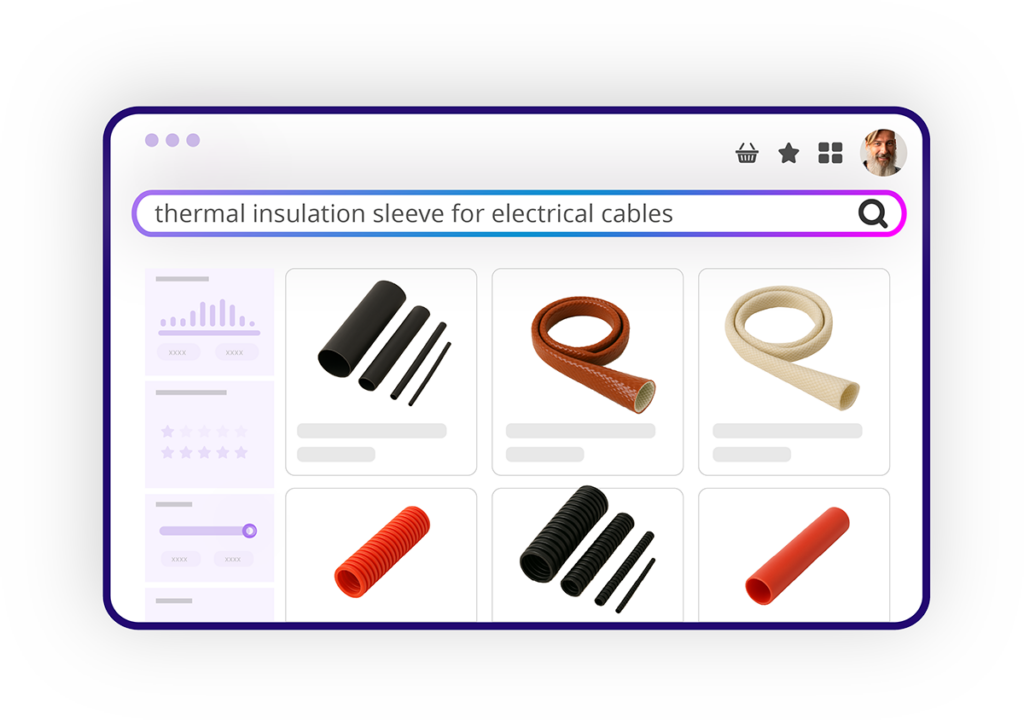Online shopping is changing. Customers want your eCommerce site search to understand them, not just keywords. So, what if your solution could listen and give them the right results no matter how they phrase their query? Meet FactFinder’s vector search.
For over two decades, we’ve conditioned ourselves to shop online using keywords, because that’s all search could understand. It works, and with the right engine behind it, it converts. But large language models (LLMs) like ChatGPT, Perplexity and Gemini, are influencing how people search. More and more, buyers expect the right results from natural language and open-ended queries. eCommerce needs to keep up.
This is where vector search comes in. Our semantic search technology understands the context and meaning behind queries where pure keyword matching reaches its limits — for example, a descriptive search like “high-performance laptop with plenty of storage for gaming”. While a good keyword-based search can pick out terms like “laptop,” “gaming” and “storage,” it often returns a mixed bag of devices and accessories — or even zero results — leaving the shopper without the gaming notebook they actually wanted.

Vector search, on the other hand, recognizes the meaning and intent behind conversational, natural language queries and instantly shows the right products — even when there are no keyword matches. This cuts bounce rates, speeds up shopping time, improves the customer experience and wins you sales and brand loyalty. Read on to uncover the magic behind FactFinder’s vector search — or hit play to watch the video walkthrough from our Vice President of Product and Technology, Holly Murdoch.
Put simply, vector search works like a navigation system on a map. In eCommerce, it turns search queries and products into numeric vectors, which act like coordinates. It then measures the distance between them using “nearest neighbor search”.
The closer the product vector is to the query vector, the more relevant it is and the higher it ranks in the search results — even if the two don’t share matching keywords in the product data.

Benefits of vector search
✔️ No more zero results — vector search brings semantic understanding to every query, helping customers find what they need even from vague and conversational language. No dead ends like with traditional search, and no manual optimizations required.
✔️ More sales — thanks to customers finding the right products faster.
✔️ Fewer bounces — customers stay engaged and inspired with relevant results from their first search.
✔️ Smarter processing of unstructured data — less manual effort, huge time and cost savings and faster return on investment (ROI).
✔️ Happier customers and higher lifetime value (LTV) — buyers are more likely to make repeat purchases and recommend you to other people.
What makes our vector search different?
Vector search has been a trending topic over the last year. So, what’s different about FactFinder’s approach?
🔒Based on our own in-house language model
Most other vector search models use online third party LLMs and language models. We use our own. That means we can keep our vector search database offline and in-house here in the EU, ensuring all data is kept 100% secure and private. No dodgy online or overseas transfers.
Plus, we train the language model ourselves. With 20+ years of eCommerce site search expertise behind us, we make sure it delivers across real-world use cases. While other vector models are built for generic tasks, ours is made for online purchases. We can even train it for specific industries, so it picks up on specialized language and understands searches in context.
🌍 Special multilingual support
Most vector search models are only tested in English, showing questionable performance in other languages, which slows your global expansion. Ours breaks through that barrier, with proven success handling complex languages like German and even multilingual queries like “rote handbag.” This enables you to deliver a flawless search experience everywhere.
🔎 Backed with advanced keyword search
Vector search is great, but it’s not always the best tool for the job. For exact matches, like product IDs or brand-name searches, keyword search often outperforms it. While keyword search shows only the specified item, vector search can return a mix of similar products that distracts from what the customer actually wants.
That’s why FactFinder blends advanced keyword search with vector capabilities — so you get exact matches when needed, and smart results when keyword search fails.
⚙️ Flexible to fit your eCommerce strategy
No two eCommerce businesses are the same. Depending on your assortment, audience and strategy, every shop has its own unique requirements. We give you the flexibility to tailor this new technology to your use case, combining the strengths of vector and keyword search for the best possible customer experience. In the intuitive backend, you can choose between two modes:
- Hybrid mode delivers a smart product list made up of both keyword-based and vector-based results. You can fine-tune the weighting between the two to match your strategy. This mode is ideal for audiences who often browse for inspiration, have limited product knowledge or shop for specific occasions, such as in fashion, DIY or beauty.
- Fallback mode steps in only when keyword matching would return no results. Instead of landing on a zero-results page and potentially leaving, customers see all products that best match the meaning of their search. Perfect for technical B2B assortments where shoppers typically search for specific product variants or SKUs, and where keyword search should take clear priority over semantic search.
Vector search in action: applying vector to your eCommerce site search
Vector search can be powerful, especially when backed by keyword search. But will it work for your business? Let’s take a look. Here are a few examples of how it performs across different industries.
Fashion shoppers increasingly search with a feeling in mind instead of a product name. Take “outfit for a first date” — vague, emotional, and open to interpretation. Keyword search would likely miss the mark, but vector search understands the intent and maps the context to real products. The result? Higher engagement and more confident buying decisions.
Vector search comes in very handy for online shoppers taking up a new sport. Generally, they have an idea of what they need but not specific features. If someone searches for “cute sneakers for a 5km park run,” vector search catches the meaning and delivers breathable, supportive sneakers for cross-country running that look good.
Many grocery shoppers know their shopping list by heart, but when faced with a special occasion or looking for inspiration, they turn to the search bar for help. A query like “vegan food for BBQ” won’t match product names directly, but vector search captures the implied requirements — plant-based products suitable for a barbecue — and suggests the perfect items.
If a B2B buyer knows their needs but not which product, vector search can find the perfect match for their specific use cases. For example, queries like “thermal insulation sleeve for electrical cables” or “roller bearing 6205 with heat resistance,” are mapped to relevant product features and categories, helping customers self-serve with confidence.

Never miss a sale again with future-proof eCommerce vector search technology
Most people still search like keyword users. But that’s changing fast. Customers are moving toward smarter tech where apps understand natural language. They don’t need to use keywords with Google anymore. So why should they have to on your site?
With our vector search, you’re already aligned with the next generation of shopping — making it more intuitive and exceeding higher expectations. Smarter eCommerce site search means fewer missed moments and more confident purchases.
Try our new vector search now. Hit the banner below to book a personalized demo and see what FactFinder can do for your business.
Already a FactFinder customer? Just get in touch with your CSM or contact us here to try out vector search on your product data.
